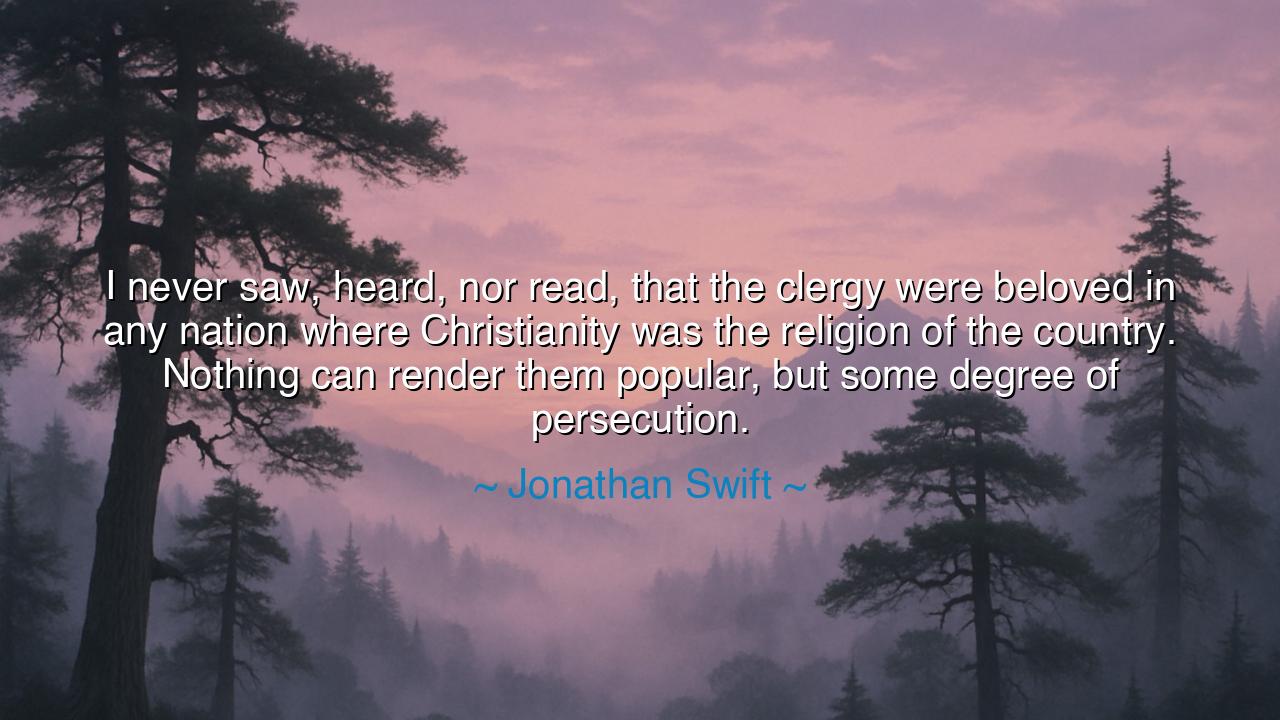
I never saw, heard, nor read, that the clergy were beloved in any
I never saw, heard, nor read, that the clergy were beloved in any nation where Christianity was the religion of the country. Nothing can render them popular, but some degree of persecution.






The words of Jonathan Swift—“I never saw, heard, nor read, that the clergy were beloved in any nation where Christianity was the religion of the country. Nothing can render them popular, but some degree of persecution.”—are forged in irony, yet burn with profound truth. Swift, master satirist and keen observer of human nature, strips away the veil of pretense to reveal the uneasy relationship between clergy and the people they serve. His words suggest that when religion holds sway as the established order, those who bear its mantle of power are rarely loved, for power breeds suspicion, and authority, even cloaked in holiness, often inspires resentment.
The origin of this saying comes from Swift’s own life as a cleric in the Church of Ireland during the turbulent eighteenth century. He was a man caught between devotion and disillusionment, between service to his office and criticism of the institution that upheld it. In observing that the clergy are beloved only in times of persecution, he exposes a paradox: when ministers suffer alongside the people, they are seen as brothers; but when they preside from lofty thrones of influence, they are perceived as rulers, and rulers are seldom loved. Swift understood that popularity grows not from privilege, but from shared suffering.
History offers many striking examples of this truth. In the days of early Christianity, when believers were hunted by the Roman Empire, the clergy who guided their flocks at risk of death were revered as heroes and martyrs. Bishops, priests, and deacons who comforted the faithful in the catacombs, or who perished in the arena, were remembered with love, their names etched in the hearts of the people. But centuries later, when Christianity became the empire’s official religion, the clergy gained wealth and authority, and admiration turned to suspicion. No longer were they martyrs but magistrates; no longer brothers in suffering, but symbols of worldly power.
The same can be seen in the history of the Reformation. Men like Martin Luther or John Calvin, who defied the weight of Rome and endured persecution for their convictions, inspired love and loyalty among their followers. Yet in time, when their movements became institutions of their own, the clergy of those traditions too became subject to criticism, mockery, and resentment. The cycle repeated, proving Swift’s point: beloved when persecuted, distrusted when enthroned.
The heart of Swift’s observation lies in human nature itself. The people admire humility and courage, but they resist domination and pride. A priest who stands with his flock in danger is cherished, for he shares their burden. But a priest who stands above them, wielding privilege, is seen as part of the oppressive order. Persecution strips away the trappings of power and reveals the humanity of the clergy, drawing the love of those they serve. Without it, they risk becoming symbols of hypocrisy, guardians of their own authority rather than shepherds of souls.
The lesson is as sharp as a blade: authority must be tempered with humility, and influence must be rooted in service. Those who lead in faith must never forget that they are not masters but servants, not rulers but companions in the human struggle. To be beloved, they must be willing to walk the hard road, to share the sufferings of their people, and to live not for privilege but for sacrifice. Without this, religion itself risks becoming hollow, its ministers respected perhaps, but rarely loved.
Practically, this teaching extends beyond the clergy to all who hold positions of power. Leaders in every field—political, spiritual, or social—must remember that love is not won by titles, nor loyalty by fear. Love is earned through humility, service, and the willingness to suffer for what is right. If leaders seek popularity, let them not grasp for privilege, but embrace the burdens of their people. For as Swift reminds us, persecution, hardship, and shared struggle are the crucibles in which genuine devotion is forged.
Thus, Swift’s words endure as both warning and guide: power without humility estranges, but suffering with others unites. Let those who lead remember that to be truly beloved is not to sit on a throne, but to kneel beside the people in their trials. Only then will authority be not resented but cherished, and leadership not feared but remembered with love.






AAdministratorAdministrator
Welcome, honored guests. Please leave a comment, we will respond soon